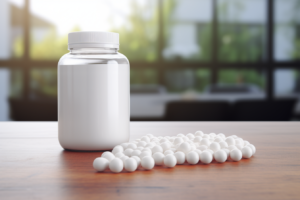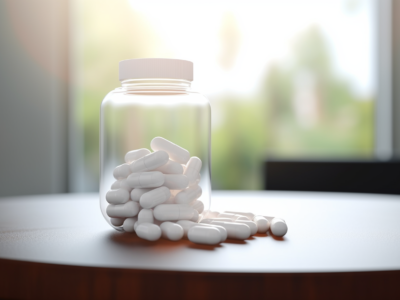L-Theanine is a natural amino acid that has been gaining popularity for its potential health benefits, including stress reduction, improved focus and concentration, and sleep quality. As with any supplement or nutrient, it’s important to understand the recommended dosage to ensure you get the most out of it without experiencing any adverse effects. In this article, we’ll explore what L-Theanine is, its general benefits, as well as how much L-Theanine you should take daily to see significant results. Whether you’re a first-time user or already supplementing with L-Theanine regularly, read on to learn more about dosing strategies for optimal results!
Understanding L-Theanine and its Benefits
L-Theanine is a unique amino acid naturally found in tea leaves, particularly green tea. It’s known for its calming properties that promote relaxation without drowsiness. Several studies have demonstrated L-Theanine’s potential health benefits such as reducing stress and anxiety levels, improving focus and concentration, boosting cognitive function, and enhancing overall sleep quality.
 When it comes to dosage instructions for L-Theanine supplements, there isn’t a one-size-fits-all approach since different factors like weight, age, gender may affect tolerance levels. However, clinical trials suggest that the optimal daily intake of L-theanine ranges between 100-400mg per day to see significant results without adverse effects.
When it comes to dosage instructions for L-Theanine supplements, there isn’t a one-size-fits-all approach since different factors like weight, age, gender may affect tolerance levels. However, clinical trials suggest that the optimal daily intake of L-theanine ranges between 100-400mg per day to see significant results without adverse effects.
Before starting any supplement regimen involving L-Theanine or other nutrients’ intake, consult with your healthcare provider first to ensure you’re taking what’s best suited for your body needs and goals.
In conclusion,L-Theanine has shown promising therapeutic potentials that many people turn to improve their wellbeing holistically given the non-habit forming nature compared to conventional medical treatments for chronic conditions. With proper dosing guidelines and precautions followed under expert supervision, integrating this multi-functional nutrient into your everyday routine can be beneficial in many aspects of life.
Factors Affecting L-Theanine Dosage
When it comes to taking L-Theanine, there are several factors that can influence the optimal dosage. These include age, weight, metabolism, and overall health status. For instance, an older individual or someone with a slower metabolism may need a smaller dose of L-Theanine than a younger person with a faster metabolism.
Another important factor is the purpose for which you’re taking L-Theanine. If you’re using it for stress relief or improved sleep quality, you may need a higher dose than if you’re incorporating it into your daily routine as a general cognitive enhancer. Additionally, some experts recommend taking L-Theanine in combination with other supplements like caffeine to amplify its effects.
Ultimately, finding the ideal dosage of L-Theanine requires some trial and error. Start with small amounts and gradually increase until you achieve the desired results without experiencing any negative side effects such as headaches or gastrointestinal discomfort. As always, consult with your healthcare provider before starting any new supplement regimen.
Recommended L-Theanine Dosage for General Use
L-Theanine is a natural amino acid that’s generally considered safe for human consumption. However, like any supplement or nutrient, it’s important to know the recommended dosage to avoid adverse effects. According to scientific research, a daily dose of 200-400mg of L-Theanine is effective in reducing stress and anxiety levels. This amount has also been shown to improve cognitive performance while producing no significant side-effects.
If you’re new to using L-Theanine supplements, start with a lower dose of around 100 mg per day and gradually increase your intake until you reach the optimal range between 200-400 mg per day based on individual tolerance and response. It’s essential not to exceed this standard dosage as taking more may cause unintended consequences such as headaches or dizziness. Overall, L-Theanine supplementation can offer various health benefits when taken at moderate doses in combination with healthy lifestyle habits like regular exercise and nutritious diet patterns.
L-Theanine Dosage for Stress and Anxiety Reduction
L-Theanine is known for its potential effects on stress and anxiety reduction, making it an attractive natural supplement for those looking to manage their daily tension. The recommended L-Theanine dosage depends on several factors, including age, gender, and overall health conditions. However, most studies suggest a daily intake ranging from 200 mg up to 400 mg.
It’s important to note that the timing of L-Theanine use may also affect its effectiveness.
For example, taking the supplement just before or during stressful events may offer better results compared to taking it at random times throughout the day.
As always with any supplements or medications, consulting with your healthcare provider prior to use is highly recommended.
Overall, L-Theanine can be an effective tool in reducing mild-to-moderate levels of stress and anxiety when taken under appropriate dosages and timings. However, individual responses may vary – thus observing oneself regarding how they react to regular doses should occur as well.
L-Theanine Dosage for Improved Focus and Concentration
L-Theanine dosage is an important factor when using this supplement for improved focus and concentration. It’s important to note that everyone’s body reacts differently to supplements, therefore there is no definitive standard dosage for L-Theanine. However, most experts recommend a daily intake of 200-400mg for significant results.
Taking too much L-Theanine can lead to unwanted side effects like dizziness or nausea. Therefore it’s critical not to exceed the recommended dosages without consulting with a healthcare professional first.
Overall, taking L-Theanine in the appropriate amounts should improve your focus and concentration, reduce anxiety and enhance your sleep quality – ultimately improving your overall wellbeing. So if you’re interested in experiencing these benefits be sure always to follow the recommended dosages carefully!
L-Theanine Dosage for Better Sleep Quality
L-Theanine is an amino acid that is found naturally in green tea, commonly used to promote relaxation and improve sleep quality. While individual needs vary depending on age, sex, weight, and health status, a typical recommended daily dose of L-Theanine ranges from 100 to 200 mg per day for optimum benefits. It’s important to note that exceeding this amount may lead to adverse effects such as headaches or digestive discomfort.
If you’re looking for better sleep quality and have tried traditional remedies without success, considering supplementing with L-Theanine may be worth exploring. However, it’s crucial to consult your healthcare provider before taking any new supplements or medications. They can help you assess if the benefits outweigh the risks and ensure that the dosage aligns with your specific health needs.
Potential Side Effects and Interactions with L-Theanine Dosage
Potential side effects of L-Theanine are typically mild and uncommon, with the supplement considered safe for most people. However, some individuals have reported experiencing headaches, dizziness, and gastrointestinal symptoms such as nausea and stomach cramps when taking higher doses of L-Theanine. It’s important to note that these side effects are generally rare and usually only occur in those who take excessive amounts of the supplement.
It’s also essential to be aware of potential interactions when taking L-Theanine alongside other medications or supplements. While there haven’t been any reported adverse reactions between L-theanine and commonly used drugs or supplements, it’s recommended to consult with a healthcare professional before starting supplementation if you’re currently using prescription medication or other dietary supplements. Additionally, pregnant women should avoid using L-Theanine as its safety during pregnancy has yet to be determined conclusively.
With This in Mind:
L-Theanine, a non-protein amino acid found in green and black tea, is known for its calming effect and potential health benefits. The Food and Drug Administration (FDA) considers L-Theanine safe, and it can be taken as a supplement or consumed naturally in tea. The recommended daily intake of L-Theanine varies, but studies often use doses ranging from 100–200 milligrams.
The benefits of L-Theanine include its neuroprotective effects and its ability to reduce the acute effects of stress. It has been found that L-Theanine may also help protect the brain by increasing blood flow. Furthermore, L-Theanine can enhance the positive effects of caffeine when taken in combination, without increasing blood pressure or causing other adverse effects associated with high caffeine intake.

Research has shown that a combination of L-Theanine and caffeine can improve cognitive function, and L-Theanine alone has been reported to have relaxing effects.
However, it’s important to remember that L-Theanine’s effects can vary depending on the individual and the dosage.
While L-Theanine is generally considered safe, it’s always wise to consider potential risks and side effects. Reported side effects are rare and typically mild, but anyone considering taking an L-Theanine supplement should consult with a healthcare provider first.
In conclusion, L-Theanine is a beneficial and safe supplement that can be used to promote relaxation and cognitive function. Whether you choose to use L-Theanine in the form of a supplement or prefer to enjoy a cup of tea, it can be a valuable addition to your daily routine.
Commonly Asked Questions:
Q: What is L-Theanine?
A: L-Theanine is a non-protein amino acid that is commonly found in green tea. It is believed to have a relaxing effect on the mind and body.
Q: What are the benefits of taking L-Theanine?
A: L-Theanine may help reduce stress and anxiety, promote relaxation, improve sleep quality, boost cognitive function, and enhance mood.
Q: Is L-Theanine safe to take?
A: L-Theanine is generally considered safe for most people. However, it is important to remember that L-Theanine supplements are not regulated by the FDA and there may be risks and side effects associated with their use.
Q: What is the recommended dosage of L-Theanine?
A: The recommended daily intake of L-Theanine is 100-400mg. Most studies have used doses of 200mg or less.
Q: Can L-Theanine be taken in the morning?
A: Yes, L-Theanine can be taken at any time of day. However, some people find that taking it in the morning can help promote relaxation and reduce anxiety throughout the day.
Q: Does L-Theanine have any adverse effects?
A: There are currently no confirmed or direct side effects associated with taking L-Theanine. However, some people may experience mild symptoms such as headaches, stomach upset, or dizziness.
Q: How does L-Theanine work?
A: L-Theanine is believed to work by increasing alpha brain wave activity, which is associated with feelings of relaxation and calmness. It may also have an effect on neurotransmitters such as serotonin and dopamine, which are involved in mood regulation.
Q: Can L-Theanine be taken with or without caffeine?
A: L-Theanine can be taken with or without caffeine. In fact, some studies have shown that combining L-Theanine with caffeine can improve cognitive function and attention.
Q: What is the effect of green tea on L-Theanine?
A: Green tea is a natural source of L-Theanine, and consuming green tea may help increase levels of L-Theanine in the body.
Q: How much L-Theanine should be taken daily?
A: The recommended daily intake of L-Theanine is 100-400mg. It is important to follow the dosage instructions on the supplement label and talk to a healthcare professional before taking L-Theanine.



 L-Theanine Supplements for Pregnancy and Fetal Development
L-Theanine Supplements for Pregnancy and Fetal Development
